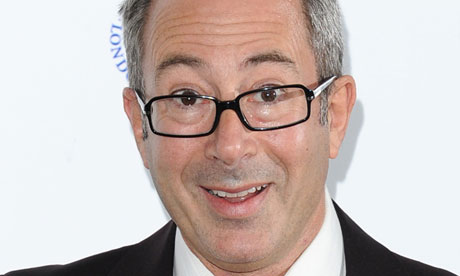
Stand-up comedy is at heart a confidence trick: you have to march on stage and convince people that they urgently want to hear what you have to say. At this, Ben Elton has always been non-pareil.
But novel writing has confidence issues too. Readers are entering into an intimate relationship with you; they want to know that they'll be looked after, and for that, they need a certain élan. Think of the bravura opening to Michel Faber's The Crimson Petal and the White: "Watch your step. Keep your wits about you. The city I am bringing to you is vast and intricate, and you have not been here before …"
Well, with Two Brothers, we very much have been here before: In fact, Ben Elton is the third successful stand- up comic to write a Holocaust novel (David Baddiel's and Stephen Fry's are both rather good).
The Jeffrey Archeresque premise – two boys born on the same day, with a maternity ward baby swap leading to a Jew and a gentile being raised as twins in a Jewish family while the Nazi party (which Elton repeatedly explains to us is a Very Bad Thing) is coming into being – is certainly readable, and the setting fascinating. But oh, this book is exasperating. Elton traces the boys growing up in 1920s Berlin. We know it's 1920s Berlin because somebody says "This man lives in the hottest craziest city in Europe! Every studio's got some wild genius in it breaking all the rules of form!" "But don't you know TB is up 300% on prewar levels!" says someone else.
Every single time you get drawn into the flow of the narrative, you are pulled up abruptly by a horrible clunk of finger-wagging exposition. Characters (who are either saints or brutes) say things such as: "Only the Jews could produce an Einstein" and "Don't you know any thick Jews?", and off they go again, like the sixth-form common room.
And has Elton done his research? Oh yes, he really has. Trust me on this. "We hoped she might swim for the Berlin Olympics, in 1936. Or Tokyo, in 1940."
It is particularly annoying because the sincerity of what Elton is trying to achieve here is so apparent. There is none of the slightly doubtful utilisation of the Holocaust that I found in The Boy in the Striped Pyjamas, as if it existed solely to make the reader upset and disgusted by any means necessary.
And Elton's prose is pacy; he can undeniably turn pages. But every time he starts to let his characters live and breathe on paper, he interrupts his own narrative with "but the Nazis have stolen our youth!" or "I don't think this will end well!" He even has a group of 15-year-olds, in 1935 Berlin, discussing seriously how they really mustn't be naughty to the Arabs when they get to Palestine. Characters cannot be people and mouthpieces at the same time; they simply fall apart, as does your patience with the narrator.
But even cardboard cutouts are not immune to the horrors of those grisly days, and the most irritated reader will find it hard not to want to know the outcome. In fact, as a popular history – the closing of the grand department store feels freshly culled from the newsreels – in which Elton could have given his own voice room to comment, this might have been rather excellent. And it is readable as an Archeresque yarn, each boy born to destiny etc etc, with the requisite number of twists and turns. Whenever the sole three-dimensional character, Dagmar, takes the stage, the story threatens to come alive with a whoosh.
But in the end the author is, I think, simply too kind, too respectful; he cannot quite bring himself to send real people into agony (the touching afterword traces the parallels within his own family history, which made me think more and more that this would have made a fascinating memoir). And so he makes do with setting the ultimate evil against heroic sacrificers; fearless fighters; beautiful, living saints. This is a shame for both the book and its readers: he should have had more confidence in us.
• Jenny Colgan's Christmas at the Cupcake Café is published by Sphere.

